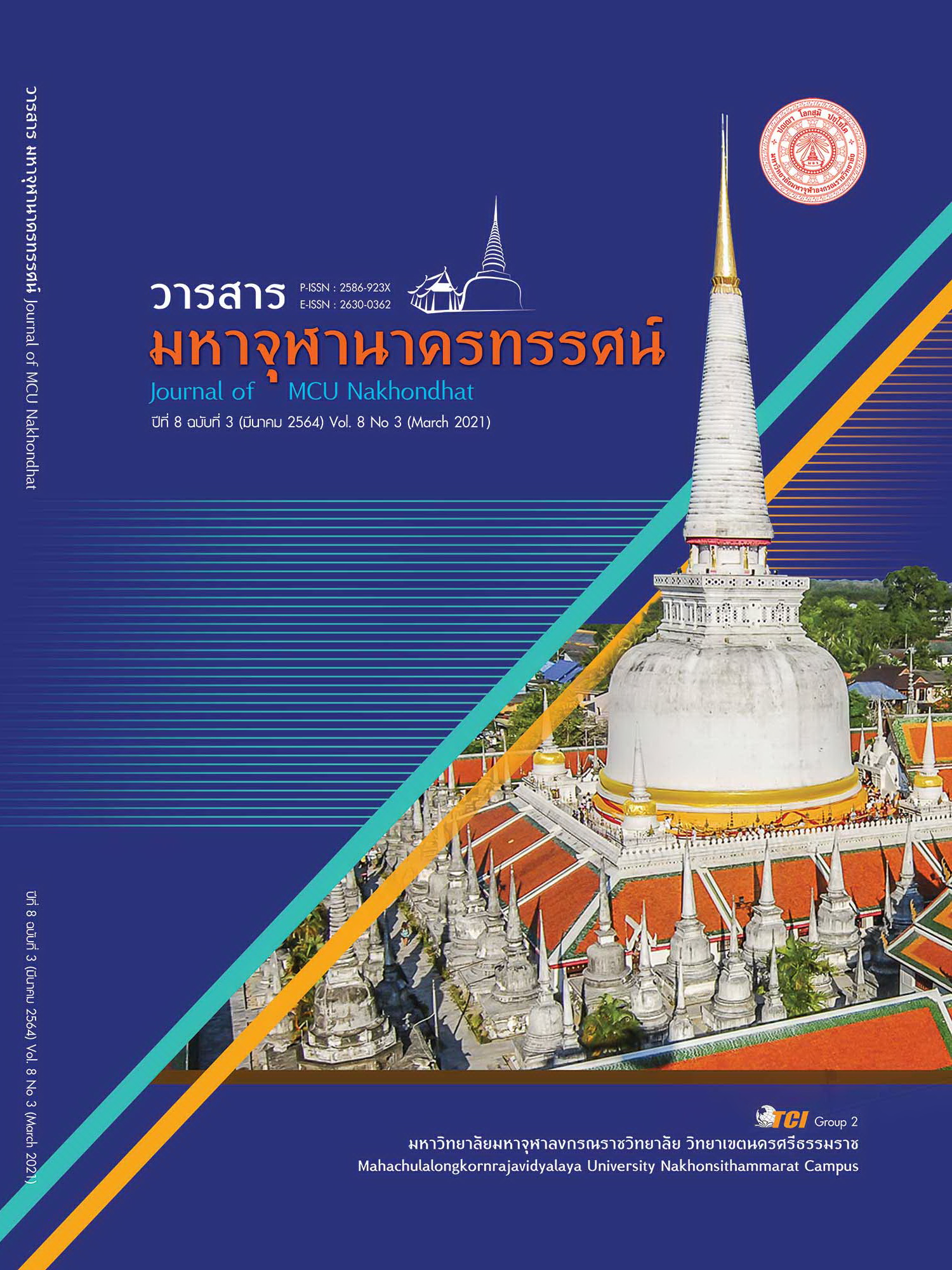THE GUIDELINES FOR DEVELOPMENT ACADEMIC LEADERSHIP OF SCHOOL ADMINISTRATORS UNDER THE OFFICE OF PRIMARY EDUCATIONAL SERVICE NONGKHAI PROVINCE
Main Article Content
Abstract
The objectives of this research article were to 1) study current state and desirable state academic leadership of the school administrators, 2) to find the guideline for development academic leadership of school administrators. The research was divided into 2 phases. Phase 1: the study of current state and desirable state of teacher to academic leadership. The samples in this study consisted of 341 teachers in academic year 2020 and selected by stratified random sampling methods. The research instrument was a five rating scale data analyzed using SPSS software find questionnaire for current state and desirable state for teachers. The statistics used for analyzing data were frequency, percentage, mean, standard deviation and index of need assessment. Phase 2: find the guideline for development academic leadership of school administrators using semi - structured interviews. The sample consisted of 5 experts selected by purposive sampling and verify the guidelines for development academic leadership of school administrators by 5 experts. The research findings are as follows 1) the current state and the desirable state were at a high level all. 2) The guideline for development academic leadership of school administrators, results of the research were as follows: Educational institutions should have brainstorming in the formulation of an educational institution curriculum development plan. Educational Supervision Innovation and technology development in every month, every 6 months and every phase Physical conditions must be properly organized, including utilities. Educational institutions that are conducive to learning and teaching Provide an academic activity room for students. Supervisory should have a key indicator (KPI), the criteria for measuring and evaluating the performance of project activities, the management should be the resources or input that will facilitate the successful operation of the organization. and Verify of the guidelines for development academic leadership of schools administrators by the experts revealed that all guidelines were feasible.
Article Details
References
จิรภา แดงขาว. (2556). การพัฒนาตัวบ่งชี้ภาวะผู้นำทางวิชาการสำหรับผู้บริหารสถานศึกษาขั้นพื้นฐาน. ใน ดุษฎีนิพนธ์การศึกษาดุษฎีบัณฑิต สาขาวิชาการบริหารการศึกษา. มหาวิทยาลัยขอนแก่น.
ธีระ รุญเจริญ. (2553). ความเป็นมืออาชีพในการจัดและบริหารการศึกษายุคปฏิรูปการศึกษา(ฉบับปรับปรงุ) เพื่อปฏิรูปรอบสองและประเมินภายนอกรอบสาม. กรุงเทพมหานคร: ข้าวฟ้าง.
บุญชม ศรีสะอาด. (2560). การวิจัยเบื้องต้น. (พิมพ์ครั้งที่ 8) กรุงเทพมหานคร: สุวีริยาสาส์น จำกัด.
วิษณุ จุลวรรณ. (2547). การวิเคราะห์องค์ประกอบของภาวะผู้นำทางวิชาการของผู้บริหารสถานศึกษาขั้นพื้นฐาน สังกัดสำนักงานการประถมศึกษาจังหวัดสระบุรี. ใน วิทยานิพนธ์ครุศาสตรมหาบัณฑิต สาขาวิชาการบริหารการศึกษา. มหาวิทยาลัยราชภัฏพระนครศรีอยุธยา.
สมศักดิ์ คงเที่ยง. (2552). การจัดการ:จากมุมมองนักบริหาร. กรุงเทพมหานคร: จี พี ไซเบอร์พรินท์.
สมาน อัศวภูมิ. (2553). การบริหารการศึกษาสมัยใหม่. แนวคิด ทฤษฎีและการปฏิบัติ. อุบลราชธานี: อุบลอ็อฟเซ็ทการพิมพ์.
สันติ บุญภิรมย์. (2553). ความสัมพันธ์ระหว่างภาวะผู้นำทางวิชาการของผู้บริหารโรงเรียนกับผลสัมฤทธิ์ทางการเรียนของนักเรียนโรงเรียนเทศบาล ในกลุ่มการศึกษาที่ 9. ใน วิทยานิพนธ์ครุศาสตรมหาบัณฑิต สาขาวิชาการบริหารการศึกษา. มหาวิทยาลัยราชภัฎเลย.
สำนักงานคณะกรรมการพัฒนาการเศรษฐกิจและสังคมแห่งชาติ. (2560). ทิศทางของแผนพัฒนาเศรษฐกิจและสังคมแห่งชาติ ฉบับที่ 12 (พ.ศ. 2560 – 2564). เรียกใช้เมื่อ 2562 เมษายน 30 จาก http://www.nesdb.go.th/ewt_dl_link.php?nid=6422
สำนักงานรับรองมาตรฐานและประเมินคุณภาพการศึกษา. (2563). แผนการศึกษาแห่งชาติ (พ.ศ. 2560 - พ.ศ. 2579). เรียกใช้เมื่อ 2562 พฤษภาคม 20 จาก http://www.moe.go.th/news/detail.php?
Mihret, A. M. (2019). Effective Leadership. 4th ed. Canada: Thomson South - Western.


